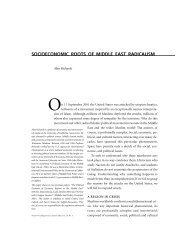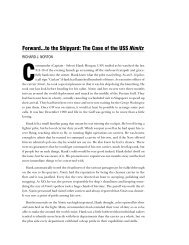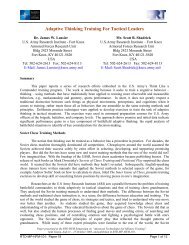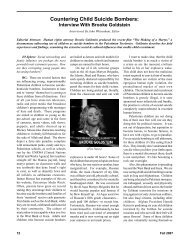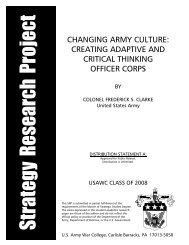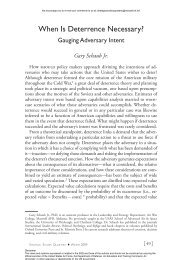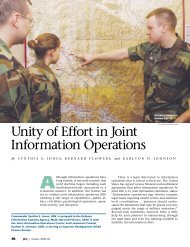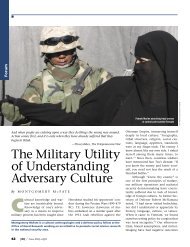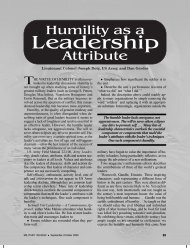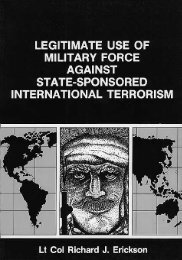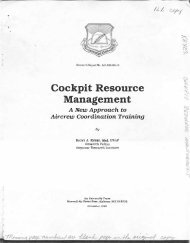Philippine Information Operations During The Hukbalahap ...
Philippine Information Operations During The Hukbalahap ...
Philippine Information Operations During The Hukbalahap ...
You also want an ePaper? Increase the reach of your titles
YUMPU automatically turns print PDFs into web optimized ePapers that Google loves.
ebellion shows that IO provides forces<br />
with the unconventional tactics necessary<br />
to defeat insurgents.<br />
Lessons For Today<br />
A striking similarity between the<br />
<strong>Philippine</strong> situation in 1946-1950 and<br />
Iraq today is the introduction of a<br />
fledgling government and an entrenched<br />
opposition. An important lesson from<br />
the Huk rebellion is that success centers<br />
around attracting and sustaining public<br />
support. Attacking insurgents simply as<br />
a “military problem” alone only served<br />
to expand the insurgent’s influence in<br />
the <strong>Philippine</strong>s. Leaders understood that<br />
the best way to gain popular support was<br />
through an effective IO campaign—not<br />
through military firepower alone.<br />
Today, U.S. forces find themselves<br />
in a similar environment that the AFP did<br />
years ago—fighting insurgents without<br />
being able to easily distinguish them<br />
from the population at large. Attracting<br />
public support while influencing the<br />
enemy is crucial in this environment.<br />
Like the AFP, U.S. forces must employ<br />
PSYOP techniques to convey “ethical<br />
and religious messages” that may cause<br />
insurgents to abandon safehouses or<br />
avoid locations. PSYOP offering<br />
amnesty or fair treatment in exchange<br />
for surrender or information must also<br />
be liberally employed.<br />
Indigenous IO Strategy<br />
<strong>The</strong> IO campaign during the Huk<br />
rebellion was an indigenous campaign.<br />
<strong>The</strong> U.S., although crucial to the<br />
campaign’s success, served only in an<br />
advisory role. <strong>The</strong> Huks were skilled<br />
at vilifying the Americans as occupiers<br />
and evil capitalists. <strong>The</strong> fact that the<br />
local populace in Luzon could identify<br />
positively with their own officials was<br />
vital to the use of IO and removed the<br />
Huk’s ability to incite anger toward<br />
“American colonialists,” as it had done<br />
in the 1930s.<br />
U.S. military forces are currently<br />
employing IO tactics in Iraq—not an<br />
indigenous Iraqi force. <strong>The</strong>refore, the<br />
U.S. must work just as hard with the<br />
new Iraqi government to devise an IO<br />
strategy that will win popular support<br />
and defeat insurgents. Today, U.S. forces<br />
must prepare the future battlespace by<br />
establishing a military advisory group<br />
that can help develop an Iraqi IO strategy<br />
against the insurgents. <strong>The</strong> U.S. must<br />
identify the insurgent’s key centers of<br />
gravity and prepare IO tactics to attack<br />
these centers of gravity. It must also<br />
determine what issues are important<br />
to the public and develop IO tactics to<br />
address these issues as well. <strong>The</strong>refore,<br />
once an Iraqi government is in place,<br />
it can center its counterinsurgency<br />
campaign around unconventional IO<br />
methods. In addition, when Iraqi forces<br />
begin employing IO tactics themselves,<br />
this will remove the insurgent’s ability<br />
to attribute these tactics to the U.S. IO<br />
tactics performed by a credible Iraqi<br />
force will likely have greater public<br />
appeal than similar tactics employed<br />
by U.S. troops. In addition, using Iraqi<br />
forces also allows more IO options<br />
such as using indigenous personnel to<br />
infiltrate insurgent groups, much like<br />
the AFP’s “Force X” teams. <strong>The</strong>refore,<br />
it is prudent to prepare now to help the<br />
new Iraqi government execute a coherent<br />
IO strategy.<br />
Military’s Expanded Role<br />
In Iraq today, the military must<br />
continue to foster the perception that it is<br />
able to assist the population. However,<br />
in addition to civil affairs performed by<br />
U.S. troops, the coalition must leverage<br />
the newly-organized Iraqi Army to fill<br />
civil affairs roles as well. Iraqi forces,<br />
guided by U.S. advisors, must also build<br />
schools, establish hospitals, and assist the<br />
local populace. This practice will not<br />
only engender greater popular support<br />
for Iraqi forces, but it will also set an<br />
important precedent of civic support and<br />
assistance within the fledgling<br />
Iraqi Army.<br />
One “high-return” civil duty<br />
the military can perform is to<br />
enforce free and fair national<br />
elections. <strong>The</strong> <strong>Philippine</strong><br />
elections of 1951 presented<br />
an excellent opportunity that<br />
greatly improved the AFP’s<br />
image and instilled trust in the<br />
electoral process. Since the<br />
1949 <strong>Philippine</strong> elections were<br />
violent and dishonest, somewhat<br />
like the sham Iraqi election in 2002,<br />
and insurgents boasted that the 1951<br />
elections would only further prove the<br />
government’s dishonesty. To reassure<br />
the public, AFP protected voting booths<br />
and quelled dishonest activity—in one<br />
case imprisoning a town’s entire police<br />
force for allowing the assassination of<br />
a candidate whom it disapproved. <strong>The</strong><br />
peaceful and honest election of 1951<br />
convinced many peasants that open<br />
elections were a sound alternative to<br />
organized revolt.<br />
Conclusion<br />
Any assertion that one aspect of a<br />
counterinsurgency campaign is solely<br />
responsible for defeating insurgents<br />
neglects the impact other activities<br />
contributed to the final outcome. Thus,<br />
asserting that the IO strategy was the “key<br />
to success” would be fallacious. What<br />
can be stated with certainty, however,<br />
is that the <strong>Philippine</strong> IO campaign<br />
was overwhelmingly successful in<br />
achieving its goal to help defeat the<br />
insurgents. Considering that, prior to<br />
introducing a comprehensive IO strategy,<br />
the <strong>Philippine</strong> government was losing the<br />
campaign against the Huks in 1949 and<br />
the dramatic way the AFP defeated the<br />
insurgents after incorporating capabilities<br />
of IO, there is a clear indication that<br />
the IO campaign was central to the<br />
government’s victory. In the end, the<br />
Huk rebellion was crushed largely due<br />
to an effective IO campaign. Certainly,<br />
current and future counterinsurgency<br />
operations must take into account the<br />
asymmetric effect an IO campaign can<br />
have to influence enemy behavior, gain<br />
popular support, and defeat insurgents.<br />
41



